

003-5022560-6168338. Entick v Carrington. Facts[edit] John Entick On 11 November 1762, the King's Chief Messenger, Nathan Carrington, and three other King's messengers, James Watson, Thomas Ardran, and Robert Blackmore, broke into the home of the Grub-street writer, John Entick (1703?
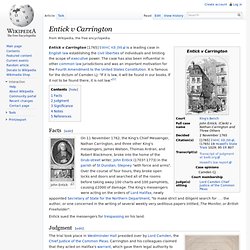
-1773) in the parish of St Dunstan, Stepney "with force and arms". Over the course of four hours, they broke open locks and doors and searched all of the rooms before taking away 100 charts and 100 pamphlets, causing £2000 of damage. The King's messengers were acting on the orders of Lord Halifax, newly appointed Secretary of State for the Northern Department, "to make strict and diligent search for . . . the author, or one concerned in the writing of several weekly very seditious papers intitled, The Monitor, or British Freeholder". Entick sued the messengers for trespassing on his land. Judgment[edit] Lord Camden Significance[edit] Notes[edit] References[edit] Cuddihy, William; Hardy, B.
Court Of Human Rights: Convictions For File-Sharing Violate Human Rights. The European Court of Human Rights has declared that the copyright monopoly stands in direct conflict with fundamental Human Rights, as defined in the European Union and elsewhere.
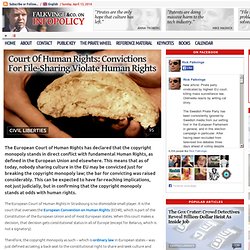
This means that as of today, nobody sharing culture in the EU may be convicted just for breaking the copyright monopoly law; the bar for convicting was raised considerably. This can be expected to have far-reaching implications, not just judicially, but in confirming that the copyright monopoly stands at odds with human rights. The European Court of Human Rights in Strasbourg is no dismissible small player. It is the court that oversees the European Convention on Human Rights (ECHR), which is part of the Constitution of the European Union and of most European states. When this court makes a decision, that decision gets constitutional status in all of Europe (except for Belarus, which is not a signatory). The Copyright Monopoly Was Always Intended To Prevent Freedom Of Expression. As I was explaining the need for copyright monopoly reform in Dublin this week, an elderly gentleman red-faced with rage exclaimed in the Q&A session that the copyright monopoly was absolutely crucial for freedom of expression.
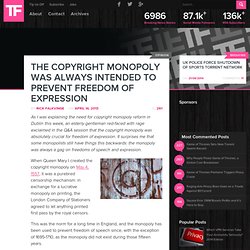
It surprises me that some monopolists still have things this backwards: the monopoly was always a gag on freedoms of speech and expression. When Queen Mary I created the copyright monopoly on May 4, 1557, it was a purebred censorship mechanism: in exchange for a lucrative monopoly on printing, the London Company of Stationers agreed to let anything printed first pass by the royal censors.
CPS Consultation : Media Guidelines. The consultation process The purpose of this consultation is to seek a wide range of views on the Director of Public Prosecution's (DPP's) interim guidelines on assessing the public interest in cases affecting the media.
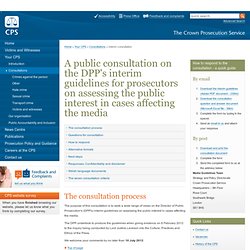
The DPP undertook to produce the guidelines when giving evidence on 8 February 2012 to the inquiry being conducted by Lord Justice Leveson into the Culture, Practices and Ethics of the Press. We welcome your comments by no later than 10 July 2012. Privacy blunder shuts online pornography consultation. Huhne partner Carina Trimingham in privacy case appeal bid. 29 June 2012Last updated at 10:37 ET The judge said Carina Trimingham was "not the purely private figure she had claimed to be" The partner of MP Chris Huhne has launched an appeal after the High Court rejected her privacy and harassment claim against Associated Newspapers.
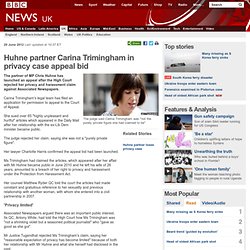
Carina Trimingham's legal team has filed an application for permission to appeal to the Court of Appeal. She sued over 65 "highly unpleasant and hurtful" articles which appeared in the Daily Mail after her relationship with the ex-Lib Dem minister became public. The judge rejected her claim, saying she was not a "purely private figure". Her lawyer Charlotte Harris confirmed the appeal bid had been launched. Ms Trimingham had claimed the articles, which appeared after her affair with Mr Huhne became public in June 2010 and he left his wife of 26 years, amounted to a breach of her right to privacy and harassment under the Protection from Harassment Act. 'Privacy limited'
Where Are The European Regulators In Charge Of Protecting Freedom Of Expression? Prince Harry naked pic. Kate Middleton Topless picture.